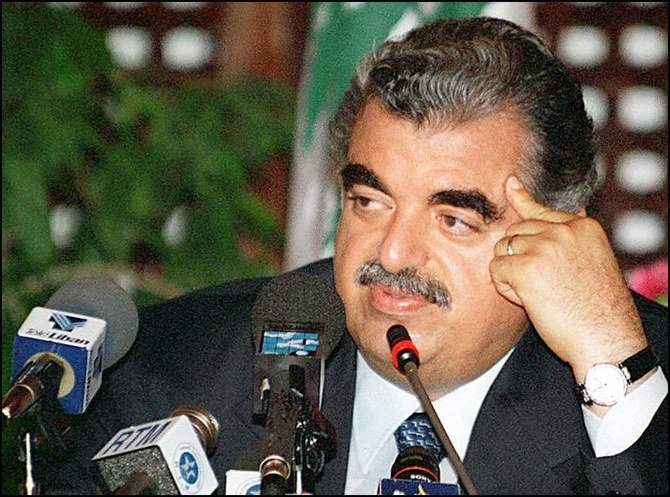
- ARAB NEWS
- 06 Jul 2025

On Valentine’s Day in 2005 Lebanon’s Prime Minister Rafik Hariri was in a motorcade on Beirut’s seafront when a blast blew up his convoy. The explosion resulted in 22 dead and 226 injured.
Hariri’s assassination was a disruptive force in Lebanese politics, changing the course it had been on since the 1990 Taif Agreement. Gen. Michel Aoun, the self-proclaimed president of Lebanon in 1988 who went to exile in 1990 in France, returned to Lebanon. Samir Geagea, the head of the Lebanese Forces party who had been in prison, was released.
The Lebanese pointed fingers at the Syrian regime as the criminal behind Hariri’s death. The assassination triggered massive but peaceful protests on the streets of Lebanon which demanded the departure of Bashar Assad’s forces. Popular protests, coupled with international pressure, compelled Assad to withdraw from Lebanon and the 30-year forced mandate of Assad’s brutal regime finally ended.
However, the Hariri assassination was followed by a series of other assassinations, either of people who might have information on the crime such as Brig. Gen. Wissam Al-Hassan, who was appointed to assist the international tribunal, and police captain Wissam Eid. The killings were further meant to stifle the free speech of such journalists as Jibran Tueini and Samir Kassir.
The balance that Hariri maintained between the different political actors, who themselves were remnants of the civil war, was lost with his assassination. Since then, Lebanon has witnessed tensions between the two camps that were formed after his death. The March 8 gathering of pro-Iran factions revolved around Hezbollah and its allies, and the March 14 camp with Hariri’s son and the Lebanese Forces was headed by Geagea and the two were the main pillars.
It is known that Hariri had tense relations with the Assad regime prior to his death. An audio recording was recently leaked of him arguing with Walid Al-Muallem. The case, under the name “Ayyash et al,” accused four people associated with Hezbollah. The fifth one, a high-level Hezbollah officer, was killed in Syria.
Hezbollah has pledged that it will not surrender any of its members if indicted by the court and described the court as a political tool to corner the group.
In 2005 the tribunal had a German prosecutor, Detlev Melhis, who named individuals linked to Hezbollah and the Assad regime as accomplices in the assassination. Melhis left after a plot to kill him was revealed. The long trial, extending over 15 years, had periods where it was very much the center of public discourse. It also had periods when nobody really talked about it. It very much depended on the relationship with Damascus. The verdict took place over a six-hour period in which the judges involved read long transcripts describing the investigation. The Lebanese president urged citizens to accept the verdict.
Nevertheless, the trial of four people in absentia was not a big achievement. They did not even communicate with the lawyers the court had appointed to defend them. They are people who are in hiding and, probably, nobody will ever see or hear from them again. Whether they were indicted or not was not the conclusion the Lebanese had been waiting for. It is not about who — physically and logistically — was responsible for the crime but rather the political will that was behind it.
To many the outcome is a disappointment. For Hezbollah, the verdict gives it breathing space amid increasing pressure.
It is political will which is responsible for the assassination of Hariri and for the assassination of the sovereignty of Lebanon. That will has been responsible for 30 years of injustice and criminality in Lebanon and its indictment is what people are waiting for.
The tribunal and its verdict, which cost around $1 billion, was supposed to have an earthquake effect. The Lebanese were expecting that, in the same way the death of Hariri was a catalyst for change on the Lebanese political scene.
However, the verdict found only one of the defendants, Ayyash, guilty while the others were found innocent. The verdict did not incriminate the Assad regime or Hezbollah.
To many the outcome is a disappointment. For Hezbollah, the verdict gives it breathing space amid increasing pressure. The important issue is how Hezbollah will respond. Will it negotiate on some sort of settlement? Or it will be emboldened in what is considered a win and a go-forward in its confrontational attitude?